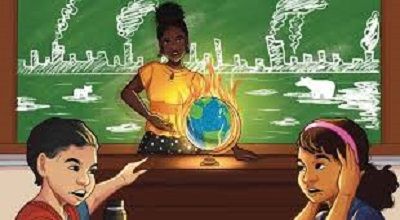Teach Students About Climate Change
Teach to students about climate change is crucial for raising awareness and empowering the next generation to address this global challenge. Here are some effective strategies and tips for teaching students about climate change:
Start with the Basics:
- Begin by explaining the fundamental concepts of climate change, such as the greenhouse effect, carbon dioxide (CO2) emissions, and the impact on global temperatures.
Age-Appropriate Materials:
- Tailor your teaching materials and methods to the age and grade level of your students. Use age-appropriate language and visuals to engage them effectively.
Interactive Learning:
- Make learning about climate change interactive and engaging. Incorporate hands-on activities, experiments, and discussions to help students grasp the concepts.
Real-World Examples:
- Use real-world examples and case studies to illustrate the effects of climate change. Show how it is already impacting ecosystems, weather patterns, and communities.
Connect to Local Context:
- Help students understand how climate change affects their local community. Discuss regional impacts, such as changing weather patterns, sea-level rise, or droughts.
Explore Solutions:
- Teach students about climate change mitigation and adaptation strategies. Discuss renewable energy sources, energy conservation, sustainable agriculture, and other solutions.
Guest Speakers:
- Invite guest speakers, such as climate scientists or local environmental activists, to share their expertise and experiences with students.
Multimedia Resources:
- Utilize multimedia resources like documentaries, videos, and online simulations to enhance learning and provide diverse perspectives on climate change.
Engage in Discussions:
- Encourage open and respectful discussions about climate change. Allow students to ask questions, express their concerns, and share their ideas for addressing the issue.
Hands-On Projects:
- Assign projects that allow students to research and explore climate-related topics, such as creating a climate action plan for their school or community.
Field Trips:
- Organize field trips to environmental centers, nature reserves, or renewable energy facilities to give students a firsthand look at environmental issues and solutions.
Cross-Curricular Approach:
- Integrate climate change topics into various subjects, such as science, social studies, mathematics, and language arts, to reinforce learning from different angles.
Encourage Critical Thinking:
- Teach students to critically evaluate information and sources related to climate change, helping them distinguish between credible and unreliable information.
Emphasize Personal Action:
- Empower students to take action in their own lives. Encourage sustainable practices, such as reducing waste, conserving energy, and advocating for change.
Stay Updated:
- Keep your own knowledge up-to-date with the latest climate science and policy developments so that you can provide accurate and current information to your students.
Be Hopeful:
- While it’s important to convey the seriousness of climate change, also emphasizes that individuals and communities can make a positive impact through collective action.
Note:
Teaching students about climate change is not just about imparting knowledge; it’s about inspiring them to become environmentally conscious and responsible global citizens who can contribute to a sustainable future.
